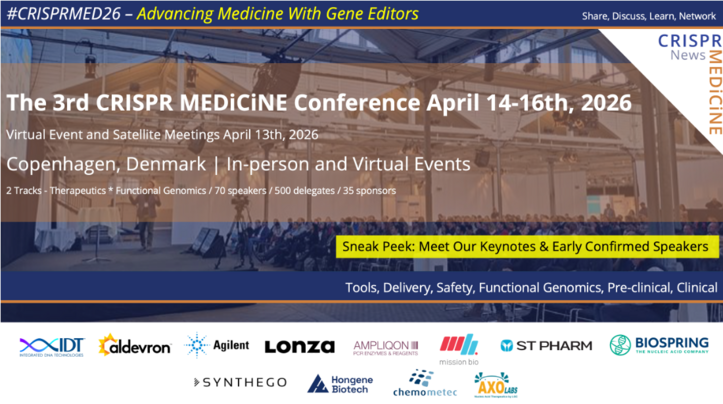CMN Weekly (14 January 2022) - Your Weekly CRISPR Medicine News
By: Karen O'Hanlon Cohrt - Jan. 14, 2022
Top Picks
- In a major medical feat, an American man has become the first person in the world to get a heart transplant from a genetically-modified pig. The pig used in the transplant had been genetically modified to knock out several genes implicated in organ rejection. The transplant was performed by surgeons at the University of Maryland School of Medicine and the patient was reported to be doing well in the days following the procedure.
- Copenhagen-based SNIPR Biome announced this week that the FDA had issued IND clearance for SNIPR001, the company's most advanced development candidate in its pipeline of CRISPR-based microbiome therapies. SNIPR001 is the first candidate of its kind to reach the IND stage, and is being developed for the treatment of potentially life-threatening E. coli infections in haematological cancer patients.
Clinical news & IND approvals
- Allogene Therapeutics announces removal of FDA clinical hold across all AlloCAR T™ clinical trials. The company previously announced on October 7th, 2021 that the FDA had placed a hold on all five of its AlloCAR T clinical trials based on a report of a chromosomal abnormality detected following AlloCAR T administration in a single patient treated with ALLO-501A in the ALPHA2 study.
- Fate Therapeutics announced this week that the FDA had cleared its investigational new drug (IND) application for FT536, a first-in-class MICA/B-targeted CAR natural killer cell therapeutic candidate for the treatment of solid tumours. FT536 will be evalauted for safety and efficacy as mono and combination therapy in a multi-center Phase 1 trial for advanced solid tumours, including non-small cell lung cancer, colorectal cancer, head and neck cancer, gastric cancer, breast cancer, ovarian cancer, and pancreatic cancer.
Industry
- Beam Therapeutics reports progress across ex vivo and in vivo pipeline of base editing therapeutics and outlines key anticipated 2022 milestones.
- Editas Medicine reports on recent progress and outlook at recent J.P. Morgan Healthcare conference. Among the milestones for 2022, the company expects to share initial clinical data for EDIT-301 in sickle cell disease by year-end, dosing of first beta thalassemia patient with EDIT-301 following recent IND clearance, as well as initiation of paediatric high-dose cohort for EDIT-101 in Leber congenital amaurosis 10 and a data update on the ongoing EDIT-101 trial in adults in the second half of 2022.
- Pfizer and Beam Therapeutics announce a four-year multi-target research collaboration to advance novel in vivo base-editing programmess for a range of rare diseases involving the liver, muscle and central nervous system. The collaboration brings together Pfizer’s experience in global drug development with Beam’s leadership in base editing and mRNA/lipid nanoparticle delivery technologies.
- 2seventy bio has announced an expanded collaboration agreement with Novo Nordisk to continue development of their joint in vivo gene-editing approach. Under the agreement, Novo Nordisk will have the option to license 2seventy bio’s proprietary mRNA-based megaTAL™ technology for the development of a new treatment approach for haemophilia A patients with the goal of offering a sustained therapeutic effect.
- Allogene Therapeutics and Antion Biosciences, an early-stage cell and gene engineering company based in Switzerland, have entered into an exclusive collaboration and global license agreement for Antion’s miRNA technology (miCAR™) to advance multiplex gene silencing as an additional tool to develop next generation allogeneic CAR T oncology products.
- ArsenalBio announces expansion of collaboration with Bristol Myers Squibb to advance T cell therapy in solid tumours. The collaboration will combine ArsenalBio’s CRISPR-based programmable cell therapy approach with Bristol Myers Squibb’s expertise in cell therapy and oncology drug development.
- Bayer and Mammoth Biosciences have announced a new collaboration to develop novel gene-editing therapies for liver-targeting diseases. The move will bringing together Mammoth’s novel CRISPR systems which includes the ultra-small Cas enzymes, including Cas14 and Casɸ, with Bayer's existing gene augmentation and induced pluripotent stem cell (iPSC) platforms.
- Cell-programming company Ginkgo Bioworks has adopted Inscripta®’s Onyx® digital genome-engineering platform to continue accelerating its genome-editing throughput to enable new applications across diverse industries from food and agriculture to industrial chemicals to pharmaceuticals. Read the press release here.
- Earlier this week, Verve Therapeutics revealed anticipated milestones for 2022 and new pre-clinical data in non-human primates on potential re-dosing or sequential dosing regimens for its novel base-editing programmes for the treatment of atherosclerotic cardiovascular disease (ASCVD) indications.
- Century Therapeutics and Bristol Myers Squibb announced a new strategic collaboration to develop up to four induced pluripotent stem cell-derived, engineered natural killer cell and/or T cell programmes for haematologic malignancies and solid tumours. The first two programmes are within acute myeloid leukaemia and multiple myeloma.
Research
- In a new study published in Cell Reports this week, researchers in the US report that the phosphatase known as SCP4 is essential for the proliferation of acute myeloid leukaemic cells, but is dispensable for the production of normal blood stem cells. They made the discovery following a CRISPR-Cas9 screen in cultured AML cells to identify phosphatases that are essential for cancer cell survival in cell cultures. The findings point towards a potentially new therapeutic target for AML.
- Research findings published in Cell this week demonstrate that engineered virus-like particles (eVLPs) can deliver base editors to animal models with high enough efficiency to show therapeutic benefit. VLPs are particles that resemble a virus but lack genetic material. They can be engineered to enter a wide variety of cells are are widely used in vaccine platforms. In the study, which was led by David Liu at the Broad Institute, the team used their new delivery strategy in mice, to disrupt a gene that is associated with high cholesterol levels in humans, and to correct a gene associated with Leber congenital amaurosis (genetic blindness).
- In a preprint on BioxRiv earlier this week, researchers from the Kleinstiver lab at Massachusetts General Hospital and Harvard Medical Schoolat describe the development of Homing Endonuclease-assisted Large-sequence Integrating CAST compleX (HELIX), a novel system that improves the properties of conventional type V-K CRISPR-associated transposases (CASTs) for programmable, cut-and-paste, multi-kilobase DNA integration.
Reviews
- CRISPR/Cas-powered nanobiosensors for diagnostics. This review explores some of the most recent advances in the field of CRISPR-powered nanotechnological biosensors, focusing on the potential for next-generation diagnostics of multiple targets, especially at the point of care and without any target amplification.
- Targeting Cancer with CRISPR/Cas9-Based Therapy. Recent advances in cancer-selective treatments based on the CRISPR-Cas9 system are discussed in this review, with a particular focus on on strategies for targeted delivery of CRISPR-Cas9 reagents to target cells, controlling Cas9 expression in target tissues, and disrupting cancer-specific genes to selectively kill cancerous cells.
- New approaches to moderate CRISPR-Cas9 activity: Addressing issues of cellular uptake and endosomal escape: This review discusses the use of peptide and nanoparticle-based systems as platforms for in vivo delivery of CRISPR-Cas9 reagents and highlights future perspectives of CRISPR-Cas9 technology and the prospects of using non-viral vectors to improve its bioavailability and therapeutic potential.
- Controlling CRISPR with small molecule regulation for somatic cell genome editing. This review focuses on small molecules that can be incorporated as regulatory switches to control Cas genome editors, describing how additional development of CRISPR-Cas-based therapies with small molecule regulation has high potential to increase editing efficiency with fewer adverse effects for somatic cell genome-editing strategies in vivo.
COVID-19
- United PPE America announced this week that its CRISPR SARS-CoV-2 Test Kit recently obtained a CE Certificate that conforms with the European Union (EU) directives and standards. UnitedPPE's kit utilises Sherlock Biosciences’ CRISPR-based SHERLOCK technique to detect COVID-19, and the latest announcement follows an agreement between UnitedPPE and Sherlock Biosciences that granted UnitedPPE a license to develop and manufacture COVID-19 diagnostic tests using Sherlock's CRISPR-based technology.
- In a study published in Nature Cell Biology yesterday, a team led by researchers at UC San Francisco report a new potential drug target that may block infection by SARS-CoV-2. The protein, called BRD2, was discovered in a CRISPRi screen to uncover druggable pathways controlling binding of the viral Spike protein to human cells. BRD2 regulates the ACE2 receptor, which the novel coronavirus relies on to gain entry to its host's cells.
Jennifer Doudna, the winner of the 2020 Nobel Prize in Chemistry, will deliver the John A. and Betty C. Moore Science as a Way of Knowing public lecture at UC Riverside on Feb. 3rd 2022. Her talk, which will be a live webinar at 4 p.m., is also part of the Chancellor’s Distinguished Lecture Series at UCR. Titled “A CRISPR View of the Genome and Genome Editing,” the lecture is free and open to the public. See here for registration details.
Tags
CLINICAL TRIALS
IND Enabling
Phase I
Phase II
Phase III
Recurrent or Progressive High-grade Glioma, (NCT06737146)
Sponsors:
Suzhou Maximum Bio-tech Co., Ltd.
Sponsors:
Suzhou Maximum Bio-tech Co., Ltd.
IND Enabling
Phase I
Phase II
Phase III
Advanced Peritoneal Malignancies or Abdominal Metastatic Solid Tumors, (NCT06912152)
Sponsors:
Zhejiang University
Sponsors:
Zhejiang University
IND Enabling
Phase I
Phase II
Phase III







